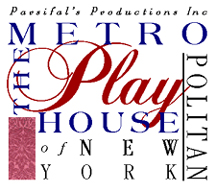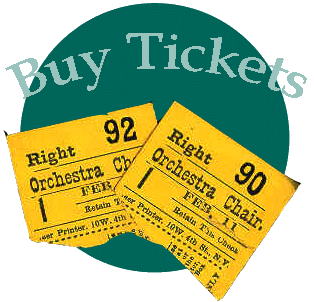
Metropolitan Playhouse
The American Legacy
The American Legacy
"Theatrical
archaeologist extraordinaire" - - Back Stage
 |
Metropolitan Playhouse
The American Legacy "Theatrical
archaeologist extraordinaire" - - Back Stage
|
|
|||||||
| Playing | Next | Season | Tickets | Company | Location | Mission | History | Links |
|
| O'NEILL (Unexpected) |
 |
|
|
|
Surprise One hundred years ago, in the summer of 1916, the Provincetown Players welcomed Eugene O’Neill into their ranks. His career “began” with their production of Bound East for Cardiff, and American theater was forever changed with the first hearing of his distinctive voice. Fine. But of course, he had written more than one play when he summered in Massachusetts—a trunkful, the story goes—and he was busily writing as the summer wore on. Out of that trunk and that summer, Metropolitan pulls two early O’Neills, neither staged in his lifetime (and almost never since), each surprising by its own lights and in light of its author’s reputation, for a beguiling and utterly unexpected bill. Both are stories of marriage and its discontents, full of hopeful transgressions, crafty revenge, broken hearts, and resilient loves. Together, they are a theatrical pas de deux by turns chilling, titillating, touching and—sometimes wryly, sometimes sweetly—very funny. An American Miss Julie with a twist worthy of Hitchcock, Recklessness (1913) follows the ingenious and cold-blooded revenge of an arrogant husband who discovers his younger wife’s affair with his chauffeur. Now I Ask You (1916), a spoof of open marriages, satirizes young Bohemian aspiration and bourgeois complacency with witty one-liners and increasingly convoluted misunderstandings. Forward-thinking Lucy, whose “ego demands freedom,” weds stolid businessman Tom on condition that they commit to free love: they are bound only by their whims and present affection. Urged on by Lucy’s well-meaning mother, Tom’s indulgence helps them both fall deep into insincere flirtations with two colorful, pretentious artists, but jealousy and pride overwhelm the tangled relationships, racing them to an hysterical, near-tragic conclusion. Connect For O’Neill fans and theater buffs, what is surprising is the same thing that enlivens the plays for the rest of us: the teasing mockery of some of his later, celebrated, and heartbreaking characters. Here are the children striving to assert their independence; the manipulative and unyielding parents; the feeling artists, too sensitive for their pragmatic fellows; the stifled creatives, yearning to express themselves; the rivalrous couples doomed to codependence; the conspirators who mistrust one another. But in these youthful experiments, they are played for frissons and laughs. At the same time, the revenge tale and the comedy are distinct from the self-serious tragedies and breezy social follies of their era. O’Neill’s misgivings about a soulful social animal’s condition ring loud and clear, and while both plays have a light touch, they are not exactly light-hearted. One opens with an adulterous liaison, the other with a gunshot; and the final satisfactions—grim or merry—are snatched from the jaws of heartbreak. The laughter resounds all the more heartily, but both plays remain as singularly complicated in tone and insight as … well, a play by Eugene O’Neill. Is it too much to ask that these whimsical bits of juvO’Neillia have something to tell us in 2016? Certainly not. The sang-froid satisfactions of Recklessness are rooted in four flawed characters who see one another as property. Bound by dependencies of unequal wealth, they engage in desperate struggles for autonomy that those disparities incite. Hardly a manifesto, it is nonetheless a trenchant indictment of a culture we know too well today: reckless, possession-obsessed, winner take nothing. The playful satire Now I Ask You blithely sends up suburban complacency and Bohemian rebellion, the challenges of devoted marriage for spirited and independent people, and the conflicts between well-intentioned parents and willful children. These particularly open targets in the early 20th century show no signs of fading a hundred years on. In 1916, the jokes were about birth control, women’s suffrage, Synchronist art, free love, the growth of a suburban commuter life, and the etiquette of smoking. The adversaries were conventional businessmen and affected Greenwich Village Bohemians. Today may not present exact parallels, but as the play pits individual predilections against society’s condemnations, Now I Ask You evokes our consternation over gender pronouns, marriage equality, body arts, and freedom of religion. As it challenges established assumptions of shared values, it speaks to the political rebellion of Millennials and “disaffected voters.” And at its heart, the comedy and pathos both derive from a fundamental quandary that is only more poignant in our age of technologically enabled withdrawal from the social contract: will our defiant striving for personal independence, leave us simply, painfully alone? Hope The success of neither play depends on comparisons with later O’Neill, as amusing as those comparisons are. Rather, it depends on their coming from the pen of an inspired and perceptive dramatist. What he achieves is what is evident in all his work: an application of the theatrical flare that characterized the turn of the century stage with a deep and subversive understanding of human nature that was ahead of his time. Just as the plays’ central characters, for better or worse, strive for liberation from the conventions that have shaped their lives, so the playwright’s work found a new voice for American theater that would build on the lively traditions of the past and embrace the dawning consciousness of the young century. And so, in each play, Metropolitan sees a message to conclude our 24th Season, the Season of Hope. -Alex Roe |
|
|
|
|
|
|
 |
|